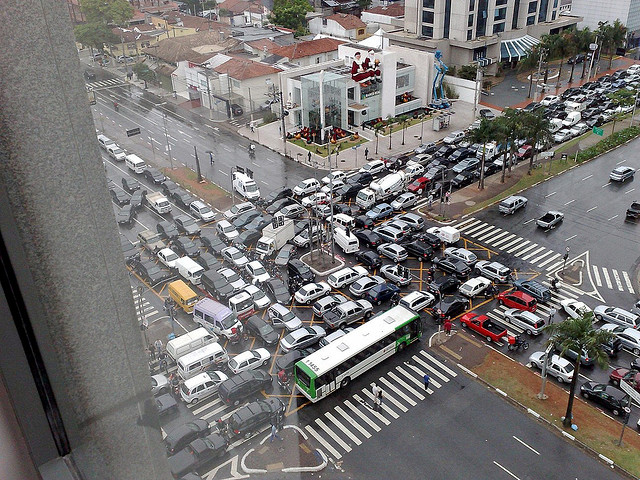Political gridlock may be coming – and it may be no bad thing

Credit: brett jordan, CC BY 2.0
Yes, US style gridlock could be coming to these shores. The party with the largest number of seats may be able to form a Government through a confidence and supply arrangement or through a narrow-majority Coalition. They may calculate that they would be no better off from a second election or the Fixed-Term Parliaments Act may prevent a second election being called (given its super-majority rule for any early election to be called). They would be able to form a Government and pass a budget but little else for which there wasn’t broad consensus in Parliament. They would be hostage to their own backbenchers on some issues and to other parties for other legislative proposals. So gridlock- the inability to pass significant legislation – could be upon us.
This sounds terrifying but, actually, would it be all that bad? It is not clear that it would be. If anything, legislation is far too easy to pass in the current system when a workable majority is in place (single party or Coalition majority). Instead of reaching for majority-rich lobbies to pass legislation to ‘deal with’ every passing political concern, parties would instead have to work to develop wider consensus. This would mean that may need to start reach beyond Parliament.
It might improve public services as they are less interfered with. Instead of immediately reaching for Parliament, Secretaries of State would have to think through how to influence the systems they wanted to change. They would have to engage professionals, local leaders and even service users to a greater extent. Power, like water, follows the path of least resistance. When it’s blocked, it finds another way.
This is precisely what has happened in the US context. It is at metro and state level that we are seeing the most interesting innovations and developments. The Federal level is blocked so the attraction of local environments becomes greater for political and social entrepreneurs. Gridlock in Westminster could divert reformist attention elsewhere (apart from the daily drama we’d have to watch). Increasingly, those who wanted to make real changes could start to look for new avenues.
And in turn, this may change the model for representatives. Quite simply, they would have little to do in Parliament. They may even decide to shorten the Westminster week and spend more time locally, developing their influence and capabilities as local leaders and civic mobilisers. We could even start to see MPs in a different fashion as even those with safe seats take advantage of the power vacuum in Westminster to become more actively engaged at a local level. They might begin to experiment with new forms of local engagement.
So we’d be watching ‘chaos’ and ‘gridlock’ at Westminster but, actually, there may be more interesting and creative uses of power throughout the system. Things may become better thought through. Legislation could pass on the basis of hard-won consensus and mobilisation. Gridlock sounds bad but it might just work. It might force us to think more deeply about how the Westminster majoritarian model works. It might open up a different type of leadership- persuasive, humble, and practical. Maybe this election and its aftermath may not be such a thing to dread. Gridlocked politics could be creative politics also. That’s the optimistic view anyhow.
—
Note: this piece originally appeared on the RSA blogs site, and is reposted with the permission of the RSA’s Director of External Affairs. It gives the views of the author, and not those of Democratic Audit or the LSE. Please read our comments policy before posting.
—
 Anthony Painter is Director of Institutional Reform at the Royal Society of Arts (RSA), and author of Left without a future? Social Justice in Anxious Times
Anthony Painter is Director of Institutional Reform at the Royal Society of Arts (RSA), and author of Left without a future? Social Justice in Anxious Times





 Democratic Audit's core funding is provided by the Joseph Rowntree Charitable Trust. Additional funding is provided by the London School of Economics.
Democratic Audit's core funding is provided by the Joseph Rowntree Charitable Trust. Additional funding is provided by the London School of Economics.
Political gridlock may be coming – and it may be no bad thing by Anthony Painter https://t.co/3HKY2cqrS9
“@PJDunleavy: UK Political gridlock may be coming – and it may be no bad thing https://t.co/MMdCOfdPJd” – more local democracy pl.
How can you be so confident that they could pass a budget?
“@PJDunleavy: Political gridlock may be coming – and it may be no bad thing https://t.co/Wrum79SQsq” agree. see https://t.co/gqwsCVDQhK
Political gridlock may be coming – and it may be no bad thing https://t.co/xcwQxflCfh
Political gridlock may be coming – and it may be no bad thing https://t.co/3VZ7xNzqSa
Political gridlock may be coming – and it may be no bad thing https://t.co/4NlZVLtWCB
UK Political gridlock may be coming – and it may be no bad thing https://t.co/TmgCqf8BCe